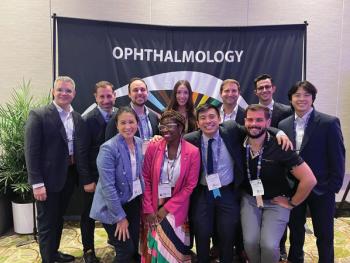
- Modern Retina Fall 2024
- Volume 4
- Issue 3
The unique role of the retina optometrist
Zhang’s journey as the first retina optometrist in Colorado
For years, the retina terrified me. I graduated from optometry school with many ocular pathology courses under my belt and disease-heavy rotations, but I still felt trepidation when examining, diagnosing, and managing diseases of the posterior segment. After optometry school, I was lucky to secure a residency in a multispecialty referral center, where my interest and knowledge of the retina continued to expand under the guidance of 2 fellowship-trained
vitreoretinal surgeons.
Paradoxically, the more I learned, the more I became aware of what I didn’t know. The journey that ultimately led me to becoming the first retina optometrist at Colorado Retina Associates (CRA) was driven by fear. After clinic, I would lie awake at night, stressing about my retina patients. Did I miss a tear? Did I refer my patients appropriately? And the worst one: If I made a mistake, will my patient lose vision? Committed to providing the best care, I spent every free moment in the retina clinic, soaking up each crumb of wisdom.
A NEW OPPORTUNITY
After three years of practice following residency, when the largest surgical and medical vitreoretinal practice in the region opened a position for their first optometrist, a dream job I did not even know could exist was suddenly within my reach. The concept of hiring an optometrist in a retina-only practice was equally exciting and foreign to both me and the retinal surgeons involved. There was no formal contract, no expansive job description, and the longevity of the role itself was to be determined based on my perceived success.
Despite the uncertainty of exactly how the position of a retina optometrist would evolve, a collaborative approach to develop my roles and responsbilities at CRA has led me down an incredibly challenging but fulfilling career path. Now, 3½ years later, I see patients independently, serve as a liason to the optometric community, design, and present continuing education programs, and serve as the clinical director for more than 90 staff members at CRA.
I spent the first 6 months at CRA in clinical rotations, 2 weeks with each of the 13 specialists in both the clinic and operating room. I routinely woke at 4 am to prep each scheduled patient, reviewing their referral notes, prior diagnostic imaging, and medical history. I examined patients: the emergent, post-op, and routine, and presented their cases to my attendings. I read landmark retina papers and studied the clinical trials that guide current practice patterns. As my knowledge and confidence grew, so did my skill and judgment. This allowed me to build mutual trust and respect with my retina specialist colleagues and forge my own independent optometric retina clinic.
EDUCATION AND CONNECTION
Aside from my clinical duties, I serve as a liaison to the optometric community, reducing barriers between the retina specialists and the referring optometrists. We approached this goal from 2 angles: 1) streamlining patient care and 2) referring doctor education.
I started our curbside consult service, where referring optometrists (and sometimes ophthalmologists) can text me cases for a quick second opinion to a Health Insurance Portability and Accountability Act–secure text line. Does this patient need to come in? How quickly should they be seen? What are my differentials? What am I looking at in this diagnostic image? I receive, on average, 25 cases per week from the referring community and treat each as a teaching opportunity to improve understanding of disease states and practical diagnostic and management tips. This allowed me to build upon my optometric retina clinic, which is helpful for referring doctors who want a second set of eyes on their patient but are unsure whether a referral to a retina specialist is necessary. My clinic is also helpful for referring doctors who do not have access to the necessary equipment (primarily optical coherence tomography) to monitor the patient’s pathology. This clinic benefits CRA physicians and patients, as they can schedule their routine follow-ups in my clinic, maximizing surgeon availability for those who require urgent treatment or procedures.
The educational component of my position now expands beyond the individual cases I’ve reviewed to the multitude of continuing education lectures we offer for the referring community. Having answered thousands of “curbside consults” over the past 3 years, I have unique insight into the content and questions that can bridge the optometric referral base and retina subspecialty. I use this knowledge to curate our CE lectures, which are offered on a quarterly basis, ensuring the topics are of interest and relevance with clinical and didactic pearls. Knowledge sharing is key to enhancing collaboration and improving patient care. When ophthalmologists and optometrists work symbiotically, it creates a more integrated approach to eye care. This leads to more accurate diagnoses, enhanced comprehensive treatment plans, and improved outcomes for patients.
GROWING IN THE PRACTICE
In addition to my clinical and educational responsibilities, I assumed the role of clinical director at my practice. With my deep understanding of the retina workflow, collegial relationships with my retina colleagues, and an interest in management, I troubleshoot clinical operation issues while balancing staff and physician viewpoints. As the first retina optometrist in Colorado, I am in disbelief of how rapidly my roles have grown since starting 3½ years ago. I have had the unique ability to evolve my position with the support and collaboration of my retina surgeon colleagues and the administrative teams at the CRA. I have grown more, both personally and professionally, in this role than at any other point in my career. I can say with confidence that the retina no longer terrifies me! •
Betty Zhang, OD
e: bzhang@retinacolorado.com
Zhang is a practicing optometrist clinical director at Colorado Retina Associates in Denver. Zhang is a speaker for Apellis Pharmaceuticals.
Articles in this issue
over 1 year ago
A great leap forward in ophthalmic drug delivery?over 1 year ago
The sights of Stockholmover 1 year ago
Higher molar dose in the real world and clinical trialsover 1 year ago
Spotlight on GA: Promoting early detection and treatmentover 1 year ago
The future of retina careNewsletter
Keep your retina practice on the forefront—subscribe for expert analysis and emerging trends in retinal disease management.












































